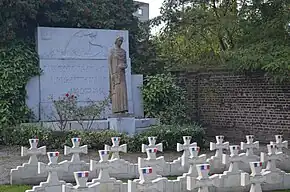National Office for Veterans and Victims of War
The National Office for Veterans and Victims of War (French: Office national des anciens combattants et victimes de guerre (ONACVG) ) is a French governmental agency under the Ministry of the Armed Forces. Its purpose is recognition and support of the nation's war veterans and victims, and directing national policy about war memorials and remembrances.
| Office national des anciens combattants et victimes de guerre | |
| Agency overview | |
|---|---|
| Preceding agencies |
|
| Motto | Memory and solidarity |
| Agency executive |
|
| Parent department | Ministry of the Armies |
| Website | www |
The current agency is the successor to the veteran's organisation first set up in 1916 during the First World War. It underwent several mergers with related veterans and war victims organisations. Its charter was expanded to include victims of terrorist incidents following the November 2015 Paris attacks.
History
.jpg.webp)
The first office to be created was the National Office of Disabled and Discharged War Veterans created by ministerial decree on 2 March 1916, during the First World War.[1] At the outset the latter was an interagency autonomous public institution managed by a board of directors. The law of 2 July 1917 established the National Office of Wards of the Nation[lower-alpha 1] and that of 19 December 1926 created the National Soldiers Office. During the years 1933 and 1934, successive mergers of the three organisations created the National Office of Veterans, Disabled, War Victims, and Wards of the Nation. In 1946 this organisation took over the management of social services of the Ministry of Prisoners, Deportees and Refugees and was renamed the National Office of Veterans and Victims of War. Since 1991, it also handles assistance to victims of terrorism.
Goals and responsibilities
The Office has three goalsː[3]
- Recognition on behalf of the Nation towards people affected by the war. It allocates recognition of their status and to the entitlements that go along with it via local services, id cards, and documents.
- Social action, as expressed by administrative assistance, by implementation of the status of Ward of the Nation by financing the cost of professional retraining, and by assistance for French citizens living abroad.
- Operation of the policy of memorials and historical preservation developed by the Armed Forces. The actions of the Office are geared towards celebrating, sharing, and conveying the memory of contemporary conflicts and the values of the Republic.
It carries out these goals by handling applications, assigning honors, and disbursing allocations according to the rights established by the law,[4] including handling applications and requests for
- veterans id cards, and for other statuses such as victimes of war
- certificates of the Nation's gratitude, and honors such as MPF (French: Mort pour la France, Died For France) and MED (French: Mort en déportation, Died as a deportee)
- reimbursement for trips to gravesites and sites of crimes related to deportation
as well as disbursing funds owed to constituents via departmental branches, as part of reparations for
- awarding veterans' pensions
- gratitude to Harkis and their widows
- management of the veterans disability card
- managing policy regarding benefits to orphans of deportation and victims of antisemitic persecution.
Operation
The agency is constituted as a legal person (établissement public à caractère administratif) with financial autonomy. It maintains delegates in every French department.
It has a board of directors whose role it is to define institutional policy. The board chair is appointed by the Council of Ministers. The board consists of 40 members[5] divided into four colleges. The first one has eight members representing the assemblies and the administrations to which they belong and serve for four years. The second college has 2 members and represents veterans and war victims selected from among the different citizen categories. The third college consists of six members representing the foundations and national associations that work for memorials and citizenship. It is chaired by the Minister Delegate for Veterans Affairs. Finally the council includes two representatives from the staff of the national office.
References
- Notes
- Ward of the Nation is a French civil status with certain attendant rights allocated by the State to those who have a parent who was injured or killed in war, or (since the November 2015 Paris attacks) during a terrorist incident, or while carrying out certain public services. Partly symbolic as "adoptees of the Nation" and partly remunerative, it goes beyond and is not to be confused with Ward of the State which in France is a minor person, such as an orphan, under the care and responsibility of the French state.[2]
- References
- "Office national des anciens combattants et victimes de guerre (ONAC) 1917-1998 (FranceArchives)" [National Office for Veterans and Victims of War (ONAV) 1917-1998]. FranceArchives (in French). Service interministériel des Archives de France. 2005-02-06. Retrieved 2019-04-06.
- McHugh, Jess (16 June 2016). "ISIS In Europe: Orphans Of Terrorism 'Adopted' By France After Charlie Hebdo And Paris Islamic State Attacks". IBT. New York: International Business Times. Retrieved 7 April 2018.
- "Présentation de l'ONACVG". ONACVG (in French). Ministry of the Armed Forces (France). 2019. Retrieved 2019-04-06.
- "Recognition and reparation | ONACVG, official website". ONACVG. Ministry of the Armed Forces (France). 2010. Archived from the original on 25 July 2010. Retrieved 2019-04-06.
- "Décret n° 2011-1658 du 29 novembre 2011 relatif au conseil d'administration de l'Office national des anciens combattants et victimes de guerre" [Decree no. 2011-1658 of 29 November 2011 regarding the board of directors of the National Office of Veterans and Victims of War]. Legifrance (in French). République française. 30 November 2011. p. 20149. Retrieved 2019-04-06 – via Textes publiés au Journal officiel de la République française.
External links
- Official website (in French)
- ONACVG, from French consulate, Boston (in English)
